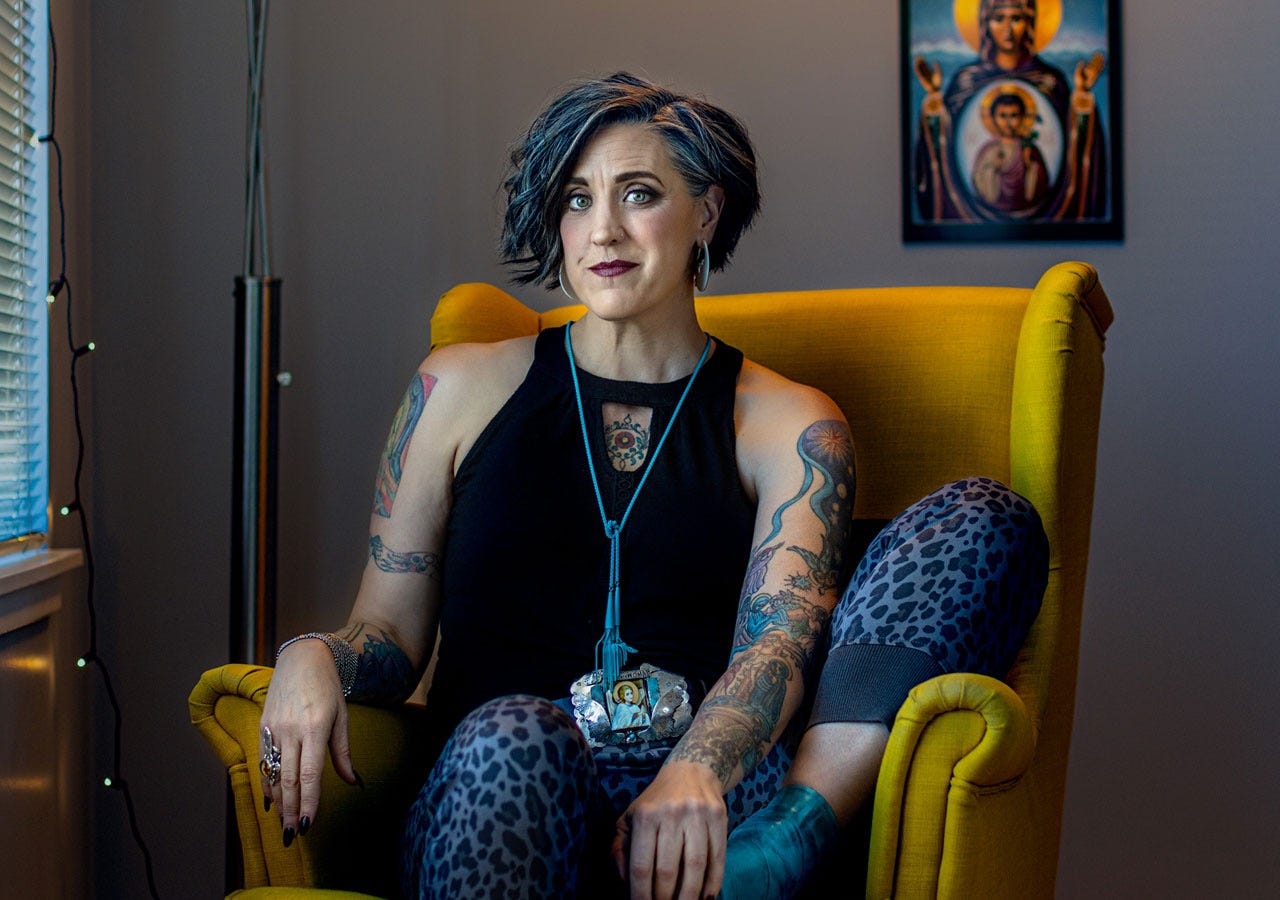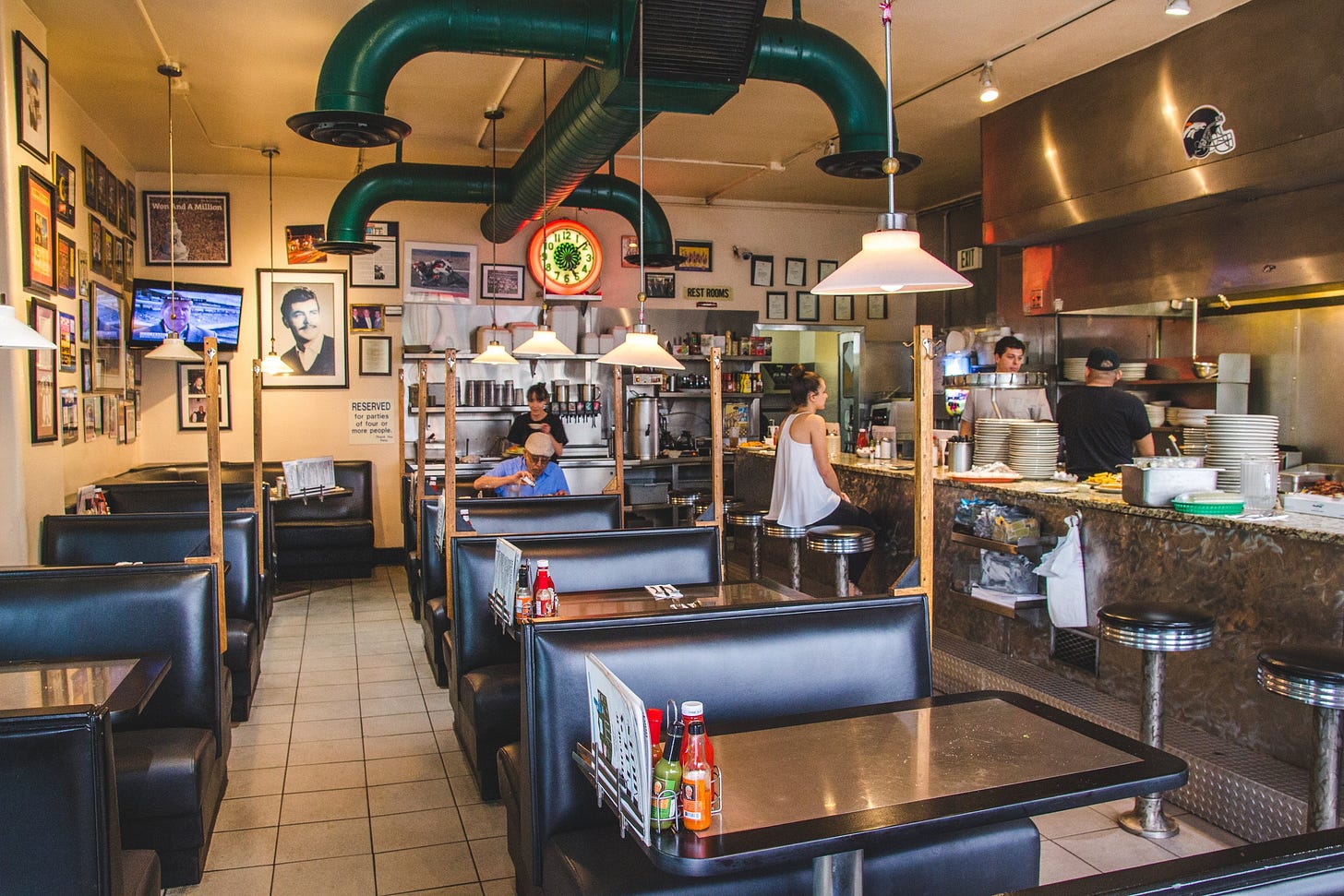Soul Boom Salutations, Beautiful Weirdos!
This week on the Soul Boom podcast, Rainn sits down with none other than Nadia Bolz-Weber—author, Lutheran pastor, tattooed theologian, and unapologetic truth teller. If you haven’t encountered Nadia before, just know that she’s about as far from your Sunday school image of a pastor as you can get—unless your Sunday school included f-bombs, radical honesty, and deep, soul-shaking grace.
Together, they wade into the glorious mess of faith, addiction, redemption, and the unexpected holiness of communal singing (because yes, belting out a hymn with strangers is apparently good for the soul—and science says so, too). They also dig into one of the biggest questions of our time: Does religion still have a place in our lives, not just as a personal spiritual practice, but as something shared, embodied, and lived in community? Spoiler: They think so. But not in the way you might expect.
In the spirit of this conversation, we’re sharing an excerpt from Nadia’s book Pastrix, specifically the chapter Ghosts in the Kingdom of Heaven. Here, she unpacks past regrets, surprising reconnections, and the small yet seismic ways the sacred sneaks up on us—especially in the aftermath of grief and loss.
In Luke 17:21, Jesus reminds us, "The kingdom of God is within you," while the Qur’án (Surah 41:53) declares, "We will show them Our signs in the world and within themselves until it becomes clear to them that it is the truth." The common thread? The sacred isn’t some far-off, glowing deity chilling on a cloud—it’s right here, woven into our daily lives, whispering from the depths of our being, showing up in the moments we least expect. The Kingdom is, quite literally, at hand.
So we invite you to read, reflect, and wrestle with this beautiful chaos right alongside us. And we’d love to hear from you: When have you caught a glimpse of that Kingdom within?
With grace upon grace,
The Soul Boom Team
Ghosts in the Kingdom of Heaven
From Pastrix: The Cranky, Beautiful Faith of a Sinner & Saint
by Nadia Bolz-Weber
The week Amy Winehouse died, I was trying to come up with a sermon for that Sunday when my ex-boyfriend sent me a Facebook friend request. I’d not heard from Ben for about seventeen years, and when I saw a friend request from him, I mostly was shocked that he, too, was not dead…
Finding out that he had come out alive, seventeen years later, was a happy surprise. I accepted the friend request, and within five minutes he had sent me a message saying he would be in town the next day and asking if we could meet for lunch…
Pete’s Kitchen never closes and had on occasion been the stage on which several dramas in my life had played. Twenty-two years earlier I had sat in the corner booth of this very diner many a three in the morning, jittery from cocaine and sloppy from booze, my best friend Jimmy usually next to me. Jimmy was loud and funny, the gay brother of my first boyfriend and for years my main partner in crime. We were baby alcoholics together, and then I got sober and he didn’t. Jimmy was found dead in his Reno apartment six months before this lunch with Ben, having quite literally drank himself to death. He took with him parts of my story not shared with anyone else, and I’ll never get those or Jimmy back. Regrettably, I had just been too busy since his death being a Lutheran pastor, of all things, to grieve him. What they don’t tell you when you get sober is that if you manage to stay that way, you will bury your friends. Not everyone gets to have a whole new shiny-but-messy life like I have, and I’ve never come up with a satisfying explanation for why that is.
Now I was a couple decades older, but the menu at Pete’s Kitchen hadn’t changed: cheap steak and eggs, foamy pancakes, many things that require ketchup. They’d replaced the vinyl and added a covered patio, which now is where folks from House for All Sinners and Saints go for pancakes after we sing vespers (evening prayer) during Lent and Advent. Usually on those nights, as I sit with my parishioners, I don’t think about all the things that have happened to their pastor in that little ironic diner, but once in a while I do get slightly quiet. I don’t know if they notice, which is fine.
My Diet Coke arrived at the table at the same time as Ben, snapping me out of my haze. He looked so much the same: like a younger version of Richard Gere, but with prison tattoos, including one of a teardrop, which I always thought best not to ask about. I gave him a hug that felt urgent, as if I had been waiting for him outside when he finally ran out of that burning building. I was surprised by the affection I felt.
He talked about his kids and his health problems and the fact that he didn’t need to go to A.A. anymore. Oh, and he was living out of his van. This lunch ended up like several others I had had over the years with people from my past: with me feeling something like survivor’s guilt. Like we were at the same place in life at one point, but now I had everything and he had nothing and I had no explanation for that whatsoever. There’s just no way for me to easily trace how it is that I’ve gotten from there to here. Somehow I have a home and a husband, two beautiful and smart children, and a meaningful job I love; while he had three children in two different states whom he seldom saw, a bad heart, a broken back, and was living on disability.
I felt awkward and tried to avoid telling him the details of my life, partly because I was certain when he left he’d say something belittling or insulting, just like he used to, to put me in my place. But before he stood up to leave, he looked across the table at me and said, “I’m glad you’re still alive, a lot of us aren’t. Um . . . is it OK if I visit your church this Sunday?”
The rest of the week I struggled to write a sermon about the kingdom of heaven while feeling like the addict ghosts of my past were all standing drunk outside my mind’s window, whining, “Why can’t you just come out and play?” I just didn’t care about mustard seeds and shrubs and yeast and I couldn’t shut up my past long enough to write a sermon in my present. Every commentary and article I read about the parables offered me the same combination of obvious and useless: The kingdom of heaven starts out small and then gets big. So what? I couldn’t imagine anyone’s life was going to be changed by my preaching about how small mustard seeds are and how they then grow into big plants and that’s what the kingdom of heaven is like.
By Saturday I was panicked. I thought obsessively about seeds and plants, straining for it to matter, which was especially hard since I loathe gardening. I don’t even like being outside. In fact, I hate being outside so much that when I go to a restaurant with my friends and the hostess asks if we’d like to sit on the outdoor patio I shoot dirty looks at everyone until they say no, inside please. I wish Jesus had used examples taken from posting on Facebook, going to the movies, and having relationships with tattoo artists, so that the meanings behind the examples would be a little fucking clearer to me, but no. He’s forever talking about seeds and vines and harvesting and plants and farmers.
Finally I wrote something down about how much my husband, Matthew, hates juniper bushes, and I described his personal battle with them. And as soon as I wrote it I knew it was crap. I took a break and got on Facebook. After liking a few posts from my friends, I saw one that said simply, RIP Amy Winehouse.
Damn.
Amy Winehouse, the British soul singer and celebrity train wreck, dead. Immediately I thought again of the fellow addicts and alcoholics in my life who had died while I still lived. Of course, I especially remembered PJ. I mentioned earlier that in many ways, it was because of PJ—and specifically, his death— that I ended up being a pastor. It was long before I went to seminary and got ordained, but doing PJ’s funeral—as his only “religious” friend—was the first time I realized that God was calling me to be a pastor to my people.
Now, PJ was dead and I was a pastor and I had to write a sermon that mattered. I thought about how, like Winehouse, PJ was found dead in his home. I laughed out loud at how great it would have been to call PJ himself and ask what he thought I should preach about, knowing he’d say something filthy and hilarious about things that are small but get bigger, none of which I could preach about but would make me laugh. But then, it felt like PJ actually took me up on it.
I looked at the parables again: “The kingdom of heaven is like a mustard seed that when it has grown becomes the greatest of all shrubs.” I wondered if maybe the size of the seed versus the size of the plant isn’t the point at all. Calling some- thing the greatest of all shrubs is like saying someone is the smartest of all the idiots. Yet Jesus says that heaven’s kingdom is like shrubs and nets and yeast. It was the yeast part that made me think that PJ was telling me something. And, for just a moment, my seminary education paid off.
I remembered that yeast was considered impure (like most of PJ’s thoughts, incidentally). We’re not talking about the little packets of Fleischmann’s you find at the supermarket; we’re talking big lumps of mold, which contaminate. There is a reason why first-century Jews were required to rid their entire house of yeast before celebrating some holy days; yeast was a ritual impurity.
So then I began to consider that maybe the kingdom of heaven is found in the unclean and surprising and even the profane. At that, thoughts of my young messed-up self and lunch with my ex-convict ex-boyfriend and the death of Amy Winehouse and Jimmy dying in his apartment stopped being a distraction and became the source of my sermon. I thought back to two days after PJ was found dead. And it became the story I told in my sermon.
PJ grew up in a nice Catholic family in a small farming town in Iowa. Not really sure how a darkly sardonic, filthy-minded comic genius came from them, but that’s another story for another time. Two days after PJ’s death, a group of my friends undertook what I can only describe as a mission of compassion: They entered the home of our dead friend and they cleared out all the pornography. Every Playboy and videotape. All of it. They wanted to spare PJ’s parents any more pain than they were already dealing with.
That, I preached, is the inbreaking of the kingdom of heaven on earth. That we might clear out the pornography from our dead friends’ homes before their nice, small-town parents come to settle their son’s affairs. It’s small, it’s surprising, and it’s a little profane, but it’s the real thing.
I mistakenly had been thinking that the kingdom of heaven was something I should be able to find an illustration for on this side of my life. Things are better now. I’m Christian and I’m clean and sober, so surely any example I might have of the kingdom of heaven would not come from Ben or PJ or my young, messy self. Any preachable image of the kingdom would surely come from gardening and being a mom and a pastor and an upstanding citizen. But that’s not what Jesus brings.
Jesus brings a kingdom ruled by the crucified one and populated by the unclean and always found in the unexpected. I’d expected to look at the past and see only mistakes that I’d moved on from, to see only damage and addiction and tragic self-delusion. But by thinking that way, I’d assumed that God was nowhere to be found back then. But that’s kind of an insult to God. It’s like saying, “You only exist when I recognize you.” The kingdom of heaven, which Jesus talked about all the time, is, as he said, here. At hand. It’s now. Wherever you are. In ways you’d never expect.
Nadia Bolz-Weber is a best-selling author, ordained Lutheran pastor, and unapologetic voice for those who have felt like outsiders in traditional faith spaces. With a background that includes stand-up comedy, addiction recovery, and a deep love for radical grace, she has become a leading advocate for a faith that is raw, inclusive, and deeply human. Her books, including Accidental Saints and Shameless, challenge religious conventions while embracing the messiness of spirituality with humor and honesty. Through her writing, speaking, and The Confessional podcast, she creates space for those seeking meaning beyond perfectionism, dogma, or shame—offering a vision of faith that meets people where they are and calls them beloved. Like Soul Boom, Nadia is also on Substack—find her at The Corners, where she shares reflections on faith, doubt, and the sacred in the everyday.









I absolutely ADORE Pastor Nadia!!! I stumbled upon her early in my ministry career and she gave me the courage to embrace who I am and my whole, vulnerable story. I was making myself sick trying to pastor like the other women in ministry around me. I leaned into the idea that God called me to ministry not in spite of who I am and where I’ve been, but because of it. What a gift you both are!!!
Dear Nadia,
I am a priest and theologian of the Orthodox Church, living and serving in Greece. I read your writings with great attention and, many times, with admiration. I often find profound insights that I borrow for my own pastoral ministry.
Although we live on different continents, in different countries, and within different Christian traditions, our common ground is that both you and I are called to speak about the Kingdom of God to people living in the year 2025.
Please remember me in your prayers.
With the love of Christ,
Fr. Justin